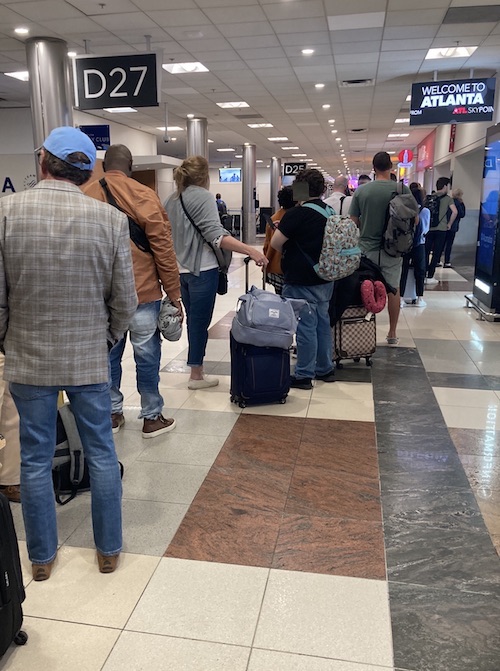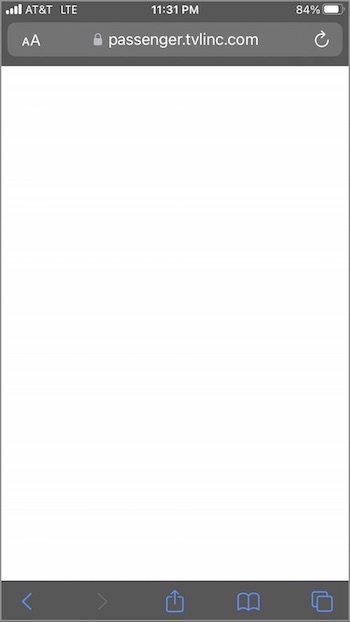My 26-hour delay on Delta Air Lines
By Mark Hurst • May 5, 2023
My flight on Delta Air Lines from Jacksonville, Florida to New York’s LaGuardia airport was supposed to take 2 hours. This was last Sunday, a day when thunderstorms blanketed the east coast from Florida to Maine, and as far west as Chicago. Looking at the weather map, I figured there would be delays, but I was unprepared for what happened next.
After about 60 of us boarded the full flight, the plane taxied toward the runway and then stopped. The pilot explained that there were delays due to the storms, so we’d have to wait until LaGuardia gave us a flight time. No one seemed to take much notice. About a half hour later was when our adventure started. The pilot came on again and announced – as though he had just noticed it – that the plane’s weather radar was not working. We’re not allowed to fly without this piece of equipment, he explained, but maintenance was on its way to take a look. We’d have to return to the gate and deplane, taking all of our bags with us.
On hearing the news, some passengers groaned a bit, muttering about the pilot taking so long to diagnose the radar problem: “Why didn’t he check that before we left the gate?” But we got up and left the plane.
After we waited in the gate area awhile, the pilot picked up the microphone and announced that maintenance was unable to fix the radar. Also, “there are no planes available here in Jacksonville, so we’ll have to fly to Atlanta, switch planes, and then fly to LaGuardia.” Not to worry, though, he said, we’ve already called ahead and they’re getting a plane ready for us. No one asked how we were suddenly allowed to fly without a weather radar. At least there were no storms on the way.
So we all got back on the plane, put our bags in the overhead bins, and sat down as the flight attendants went through the safety briefing a second time. We flew to Atlanta and then deplaned, taking all of our bags with us.
“Good news,” the pilot told us in the gate area. “The new plane is here.” Once we boarded, he said, he would confirm a new arrival time at LaGuardia that would get us there with a delay of just over four hours.
But we ended up waiting longer. Much longer. (My memory is hazy here: there may have been another round of boarding, waiting on the tarmac, and deplaning at this point – or maybe we just stood and stood and stood, poised like prairie dogs, waiting for the boarding announcement. Either way, we ended up waiting at the gate.) Around this time passengers started commiserating with each other. Small groups started forming – new friendships, forged in frustration. After some time, the pilot came back and said that LaGuardia had given us a new flight time. It was three and a half hours away.
Groans, some “No!” exclamations, and a few other choice words. The passengers started to disperse to look for dinner, some walking together with their newfound friends.
Get Mark Hurst’s weekly writings in email: Subscribe. (Or join the CG Forum.)
Sign up for this newsletter.
Three or so hours later, we gathered again, our hardy little crew. We were boarding! A plane with a working weather radar! With a landing slot assigned at LaGuardia! On the plane we went, bags in overhead bins, seat belts on, safety briefing (third or fourth time). We taxied out onto the tarmac. Then we stopped.
After a long wait, the pilot came on the intercom. “Well, we have a problem,” he said. “I can’t get an accurate count of the bags we’ve loaded.” The ground crew, the pilot explained, had given him “literally three different counts” of the checked luggage. But he needed an accurate count in order to take off. So, he concluded, “we’re going to have to return to the gate, and you’ll have to deplane . . .”
If the pilot said anything after this, I didn’t hear it over the yelling. Passengers were now visibly (and audibly) angry. I half-expected to see random objects thrown in the air, like when chaos breaks out on the Muppet Show. But beyond the yelling, people stayed pretty well behaved. The plane turned around and started back to the gate.
Once at the gate, the pilot came on to announce that we didn’t have to deplane, as the ground crew could count the bags without that happening. So we stayed seated, and waited. After awhile, the pilot came on and said we were all set, the bag count was correct, and we were ready to take off. Some grumbling among the passengers, along the lines of “it’s about time.” People were ready to leave.
But then, I would estimate not more than two minutes after that last announcement, the pilot came on the intercom again. “We’ve timed out,” he said cryptically, and turned off the microphone. Groans, once again, from those of us who knew what that meant: a flight crew is only allowed to work a certain number of hours in a row. A few minutes later the pilot came back on to explain. The flight was now officially cancelled, so we were returning to the gate, where we’d have to deplane, taking all our bags with us.
I’ll leave the passengers’ reaction to your imagination. But again I was surprised not to see Muppet chaos on the plane: no Beaker flying through the air, no boots or fish or . . . anyway, I guess people were too tired for that.
Back to the gate we went. We deplaned. It was now 10pm and the Atlanta airport was mostly deserted. So our dejected, bedraggled crew trudged down the terminal until we arrived at the Delta Air Lines customer service desk. A line formed, snaking down the terminal hallway, as we waited our turn to talk to the gate agents about booking a new flight, and a hotel.

I’ll fast forward, as this has gone on long enough. I was able to get rebooked for the next day – but since all the New York airports, and Philadelphia, were booked solid, I settled on Allentown, PA, figuring I could rent a car and drive home from there. And the next day, that’s exactly what I did, getting back to New York after a 26-hour delay. (Thanks to the nice people at the Allentown aiport for running a friendly and efficient operation.)
But in Atlanta on that late Sunday night, after re-booking my flight, I still needed to book a hotel. It was 11pm and I really wanted some sleep. The customer service agent told me to check my phone: sure enough, there was an automated text from Delta Air Lines with a link to a booking page. The hotel link worked, but then there was the “transportation voucher,” a kind of online coupon for a Lyft to the hotel.
When I tapped the link to claim the Lyft voucher, here’s what I saw:

The blank screen appeared no matter how many times I reloaded the page, on two different browsers. I was stuck. Delta Air Lines had implemented a poorly designed website as the only option for passengers to get to their hotel. And a smartphone was more or less required. What would passengers do if they had a flip phone, or no phone at all? Sleep on the terminal floor, I guess.
In the end, I booked a Lyft myself. Given the demand for Lyft rides from the Atlanta airport, the profit-maximizing algorithm assigned me a price of over $100 to get to my hotel. (In the morning, the price back to the airport was $30.) I hope to get reimbursed from Delta some day.
Get Mark Hurst’s weekly writings in email: Subscribe. (Or join the CG Forum.)
Sign up for this newsletter.
Conclusions
Anyone who’s travelled enough has their own horror stories of delays and cancellations, so this is probably a familiar story. But I think there are lessons here worth paying attention to, especially around the role that finance and technology played in making this experience a lot worse than it should have been:
• There’s not enough slack in the system. Everything is strung so tight that any disruption causes a cascade of delays. Why would a broken weather radar send a plane back to Atlanta? The system is too centralized around hubs, with only the most profitable routes allowed to stay active, and not enough resources available outside the hubs. Airlines are discontinuing service to smaller airports recently, they say because of a pilot shortage. I think it has to do with the consolidation of the airlines into a winner-take-all, monopoly-driven market.
• The system has put too much faith in automation. Once the centralized, strung-tight system starts to break, there are not enough humans available to fix the problem. I called the Delta customer service phone line on Sunday night and the phone-bot told me that there would be a 52-minute wait. I stood in line for an hour instead. Even then I was forced to use automated technology that didn’t work: it was impossible to book transportation to the hotel because Delta had built a crappy website.
• Surveillance technology is becoming mandatory. Without a smartphone, I wouldn’t have been able to get Delta to book me a hotel. People who avoid smartphones would have been out of luck. Then the next day when I went through the TSA line at the Atlanta airport, I had to submit to a facial-recognition scan. Mandatory. A little sign under the scanner said something like “The TSA will delete your image after it has been used to identify you.” No further explanation, no pointer for more details, no stated alternative for opting out. Carry a smartphone, and submit to a biometric scan, or don’t bother traveling through airports any more.
Our current system shows the results of thirty years of consolidation in the airlines (and most other industries), thirty years of IT investment with a misplaced faith in automation, thirty years of profit maximization and chasing stock growth – all at the cost of generating good, human-centered experiences in airline travel. A few people have gotten rich as a result, and the rest of us are left with an air travel system that is strung too tight, run by overworked employees, and bristling with surveillance.
We need to fix the airlines, just like we need to fix Big Tech, just like we need to fix our financial system. We need to make them better.
- - -
To share this on social media, use this text:
My 26-hour delay on Delta Air Lines, by Mark Hurst –
https://creativegood.com/blog/23/my-26-hour-delay-on-delta-air-lines.html
Get Mark Hurst’s weekly writings in email: Subscribe. (Or join the CG Forum.)
Sign up for this newsletter.
Until next time,
-mark
Mark Hurst, founder, Creative Good – see official announcement and join as a member
Email: mark@creativegood.com
Read my non-toxic tech reviews at Good Reports
Listen to my podcast/radio show: techtonic.fm
Subscribe to my email newsletter
Sign up for my to-do list with privacy built in, Good Todo
On Mastodon: @markhurst@mastodon.social
- – -